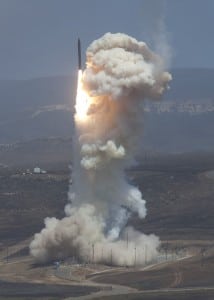The Missile Defense Agency (MDA) is seeking industry comments on why a solicitation for a contract to design, develop, test and field the next Ground-based Midcourse Defense (GMD) Weapon System (GWS) only received one bid so it can improve the process going forward.
This came after MDA awarded Northrop Grumman
[NOC] a $3.287 billion contract last July to design, develop, test and field the next GWS program (Defense Daily, Aug. 1, 2022).

The GMD system seeks to protect the U.S. from a small number of intercontinental ballistic missiles, primarily from North Korea.
This contract has the company continue to provide capability to operate the GMD weapon system and conduct systems engineering, design, development, integration, testing and fielding of software and hardware for the current Ground-Based Interceptors (GBIs) warfighter needs as well as new requirements like the Next Generation Interceptor (NGI).
MDA previously said the GWS contract will also update legacy systems to keep the GBIs effective while it develops NGI (Defense Daily, Nov. 2, 2021).
The NGI is under development with two competitors working to create an improved rocket booster and kill vehicles to intercept missiles, improving upon the GBIs.
MDA said this latest request for information (RFI) is seeking industry feedback “on the rationale for not submitting a proposal in response” to the GWS solicitation, since only Northrop Grumman responded to the competition.
The final solicitation was published in the fall of 2021 (Defense Daily, Nov. 2, 2021).
“This notice is not a request for proposals. It is a request for industry feedback, which will be used for informational purposes only when considering how MDA can overcome barriers to competition for future requirements,” the RFI said,
DoD spent years exploring the most optimal management structure for GMD development, operations, sustainment and production rather than merely continuing the current GMD system development and sustainment contract (DSC), held by Boeing [BA] for over 10 years.
In 2018 MDA announced it will not replace Boeing as prime integrator for GMD when a review found the change would add unacceptable risk to the program (Defense Daily Jan. 18, 2018).
However, MDA awarded Boeing a $6.56 billion modification in 2018 to extend DSC work through 2023.
Then in 2021, the agency decided on splitting the DSC into five separate contracts, dubbing the new contracting architecture GM Futures. The pieces include GWS; systems integration, test and readiness (SITR); and three sole-source contracts to cover the in-service fleet.
Boeing won the $5 billion five-year SITR contract last August. That work includes overall GMD element engineering, integration, planning and execution of all necessary testing to verify requirements compliance as well as day-to-day systems operations and readiness, routine maintenance, and analysis of EMG element health. (Defense Daily, Aug. 30, 2022).
In contrast to the GWS competition, the Defense Department previously said the SITR competition has three proposals.
MDA noted participation in this request is voluntary and the government will not pay for any information submitted.
The RFI was issued under Defense Federal Acquisition Regulation Supplement (DFARS) – PGI 215.371-2, which seeks to promote competition.
The regulation states that in competitive solicitations when more than one potential offeror expressed an interest in the acquisition but only one was received, the contracting officer shall seek feedback/issue an RFI from potential offerors on their decision-making.
The rule says “agencies shall use any feedback received when considering how to overcome barriers to competition for future requirements.”
Responses to the RFI are due by March 14.
